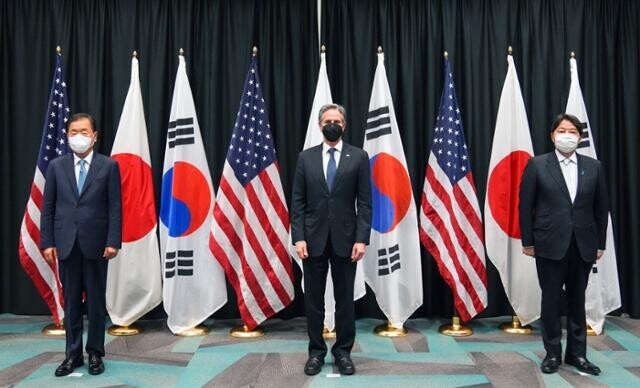hankyoreh
Links to other country sites 다른 나라 사이트 링크
S. Korean foreign minister proposes new ways to engage N. Korea in summit with US

The foreign ministers of South Korea, the US, and Japan issued a statement Saturday condemning North Korea’s ballistic missile launches and urging the country to halt illegal activities such as missile testing and take part in dialogue.
The joint statement was announced after a trilateral meeting in Honolulu that day among South Korean Minister of Foreign Affairs Chung Eui-yong, US Secretary of State Antony Blinken, and Japanese Minister of Foreign Affairs Yoshimasa Hayashi.
“The Secretary and Foreign Ministers condemned the DPRK’s recent ballistic missile launches and expressed deep concern about the destabilizing nature of these actions,” the statement read. The DPRK is an abbreviated form of North Korea’s official name.
The ministers also “emphasized they held no hostile intent towards the DPRK and underscored continued openness to meeting the DPRK without preconditions.”
In a joint press availability with Chung and Hayashi the same day, Blinken said the three of them would “continue to work to find ways to hold the DPRK accountable” for its missile launches.
Chung said the three sides had “reaffirmed our shared goals of achieving complete denuclearization and establishment of lasting peace on the Korean Peninsula through dialogue and diplomacy, and we reached consensus in three aspects.”
“We reaffirmed that diplomacy and dialogue with the North is of greater importance than ever, and to bring forward engagement with Pyongyang we exchanged views on a variety of realistic measures,” he continued.
A South Korean Ministry of Foreign Affairs official said, “There was a deep exchange of ideas for engaging North Korea at the meeting of South Korean US foreign ministers.”
“We proposed a few things that incorporated some new content, and the US listened to what we had to say,” they added.
The same official said Seoul had “explored and communicated to the US the potential for North Korea to be receptive and for this to be an effective means of breaking through the current situation.”
The three ministers’ joint statement also signaled their aim of keeping China in check, expressing their “shared concern about activities that undermine the rules-based international order” — a term frequently used by the US when criticizing China.
The statement further emphasized the “importance of peace and stability in the Taiwan Strait.” It also included references to the ministers “discuss[ing] the Russian military build-up along Ukraine’s borders and shar[ing] unwavering support for Ukraine’s sovereignty and territorial integrity,” and to “condemn[ing] the Myanmar regime’s violence committed against the people of Myanmar and commit[ting] to intensify efforts toward the immediate cessation of all violence, the release of those who are arbitrarily detained, and a swift return to the path of inclusive democracy.”
While the three sides were coordinating on those issues, South Korea and Japan were facing off over the latter’s attempts to register the Sado mine complex — a site where Koreans were forced to perform labor — on the UNESCO World Heritage list.
Meeting separately with Hayashi that afternoon, Chung called for “discussions toward solutions that are acceptable to the victims” on the matters of forced labor mobilization and sexual slavery during the Japanese occupation of Korea.
He also protested Japan’s decision to register the Sado mine complex as a World Heritage site, while insisting on Japan honoring its commitment to follow-up measures at the time of its 2015 registration of its “Sites of Japan’s Meiji Industrial Revolution,” which included the island of Hashima — also known as Gunkanjima or Battleship Island — another site of forced labor by Koreans.
According to the Japanese Ministry of Foreign Affairs, Hayashi replied that Japan “cannot accept South Korea’s independent claims regarding the Sado mines,” while reiterating Tokyo’s position that South Korea is responsible for “developing appropriate response measures” in connection with such historical issues.
An official with Korea’s Ministry of Foreign Affairs said, “While there are significant differences in the two sides’ positions on various matters, we intend to work toward finding a solution through ongoing communication in the future.”
By Kwon Hyuk-chul, staff reporter; Kim So-youn, Tokyo correspondent
Please direct questions or comments to [english@hani.co.kr]

Editorial・opinion
![[Column] Life on our Trisolaris [Column] Life on our Trisolaris](https://flexible.img.hani.co.kr/flexible/normal/500/300/imgdb/original/2024/0505/4817148682278544.jpg) [Column] Life on our Trisolaris
[Column] Life on our Trisolaris![[Editorial] Penalties for airing allegations against Korea’s first lady endanger free press [Editorial] Penalties for airing allegations against Korea’s first lady endanger free press](https://flexible.img.hani.co.kr/flexible/normal/500/300/imgdb/original/2024/0502/1817146398095106.jpg) [Editorial] Penalties for airing allegations against Korea’s first lady endanger free press
[Editorial] Penalties for airing allegations against Korea’s first lady endanger free press- [Editorial] Yoon must halt procurement of SM-3 interceptor missiles
- [Guest essay] Maybe Korea’s rapid population decline is an opportunity, not a crisis
- [Column] Can Yoon steer diplomacy with Russia, China back on track?
- [Column] Season 2 of special prosecutor probe may be coming to Korea soon
- [Column] Park Geun-hye déjà vu in Yoon Suk-yeol
- [Editorial] New weight of N. Korea’s nuclear threats makes dialogue all the more urgent
- [Guest essay] The real reason Korea’s new right wants to dub Rhee a founding father
- [Column] ‘Choson’: Is it time we start referring to N. Korea in its own terms?
Most viewed articles
- 160% of young Koreans see no need to have kids after marriage
- 2Presidential office warns of veto in response to opposition passing special counsel probe act
- 3New sex-ed guidelines forbid teaching about homosexuality
- 4Months and months of overdue wages are pushing migrant workers in Korea into debt
- 5OECD upgrades Korea’s growth forecast from 2.2% to 2.6%
- 6[Guest essay] Maybe Korea’s rapid population decline is an opportunity, not a crisis
- 7[Column] Life on our Trisolaris
- 8Another chaebol heir caught smuggling liquid marijuana into South Korea
- 9S. Korea discusses participation in defense development with AUKUS alliance
- 10Bills for Itaewon crush inquiry, special counsel probe into Marine’s death pass National Assembly